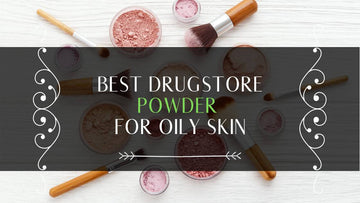Why Do I Break Out After Using Face Scrub? Exfoliation Causes Acne??
por Shopify API en Feb 06, 2026

Why do I break out after using face scrub? Uncover the overlooked causes of breakouts after using face scrub and learn how to prevent them for clearer, healthier skin.
Welcome to the Videri beauty sphere, where we decode your skincare conundrums with clarity and care. Have you ever faced the puzzling predicament of breakouts after a seemingly rejuvenating face scrub?
It's a common concern that leaves many in a cycle of exfoliation frustration. In this insightful exploration, we'll delve into the reasons behind these post-scrub skin flare-ups.
From over-exfoliation to ingredient sensitivities, we're here to uncover the "why" behind your skincare woes and guide you towards a glowing, smooth complexion. So, let's buff away the mystery and reveal the secrets to a scrub routine that respects and revitalizes your skin.
Can facial scrubs cause breakouts?
Yes, facial scrubs can cause breakouts if they are too abrasive, used too frequently, or if they contain irritating ingredients. Over-exfoliation can damage the skin barrier, leading to increased sensitivity and breakouts. Additionally, if the scrub contains comedogenic components, it can clog pores and trigger acne. It's essential to choose a scrub suitable for your skin type and use it moderately.

Does Exfoliation Causes Breakouts Or Is It Purging?
Exfoliation doesn't inherently cause breakouts; it can trigger a purging process where increased cell turnover pushes existing clogs to the surface, appearing as pimples.
This is temporary and should clear up as your skin acclimates to the exfoliation. However, over-exfoliation or using products that are too harsh can irritate the skin and disrupt its barrier, potentially leading to breakouts.
It's important to exfoliate gently and choose the right type of exfoliant for your skin type to minimize the risk of irritation and breakouts. If breakouts persist, consider consulting a dermatologist.
Worst Face Scrubs - These Can Make You Breakout
Face scrubs can be a double-edged sword for your skincare routine. Some scrubs are notorious for causing breakouts due to their harsh ingredients or abrasive particles. For instance, scrubs with walnut shells, like St. Ives Apricot Scrub, can create micro-tears in the skin, leading to inflammation and breakouts. Similarly, scrubs that include alcohol or menthol can strip the skin of its natural oils, triggering an overproduction of oil and subsequent acne.

Products such as Clean & Clear Deep Action Exfoliating Scrub also fall into this category, often being too aggressive for sensitive skin types. Neutrogena Deep Clean Scrub, while popular, contains alcohol and can be overly drying, disrupting the skin's barrier function. The presence of comedogenic ingredients in some scrubs, like coconut oil in certain formulations, can clog pores and exacerbate acne issues.
When choosing a scrub, it's crucial to select one with gentle exfoliants, like jojoba beads or polyethylene, and to avoid those with harsh chemicals and rough particles that can harm the skin's surface. Remember, gentler is often better, especially for those with acne-prone or sensitive skin.
Why Do Face Scrubs Lead To Breakouts?
1. Over scrubbing
Your skin can only take some pressure before it starts reacting.
If you scrub your face for a long or daily, you might damage your skin and end up causing some inflammations that are irritating.
This inflammation might develop into something serious like acne or scars.
It would be best if you scrubbed your face for at least 5-10 minutes
Overdoing the scrub part will damage your skin instead of taking good care of your skin.
2. Expired product
An expired face scrub contains some chemicals that might end up causing some breakouts or, in the worst cases, burn your face.
The substances created once the face scrub can also cause some allergic reactions to your face.
Ditch all expired products no matter how expensive they are.
Using them on your face will not be beneficial.
Furthermore, you might be creating permanent problems.
3. Allergic reaction
Allergy manifests itself in the form of rashes that are so irritating. You might be allergic to some components of the face scrub without your knowledge.
Once you use the face scrub, you have breakouts that you might think are normal. However, breakouts as a result of allergies are not typical.
Before buying a product, make sure you know all the ingredients used.
You should check with your dermatologist to determine if the product will work for you
If you notice you are allergic to any chemical components, you will have to toss the face scrub.
Another reason why you might be getting facial breakouts after scrubbing is if you are using a low-quality face scrub.
Face scrub with large particles might also cause breakouts.
Can exfoliating scrubs cause breakouts?

Exfoliating scrubs can cause harmless breakouts while getting rid of other skin imperfections like acne
Using an exfoliating scrub determines if you will get flights or clear, glowing skin.
Using too much pressure on your skin will cause some irritating inflammations.
So if you want the best results when using a face scrub, follow the given instructions and be gentle.
If you notice more breakouts than usual, you should schedule an appointment with your dermatologist.
Alternatively, you should ditch the product giving you flights and try a new one recommended by a skin expert.
How do I heal breakouts on my skin after exfoliation?

Although scrub breakouts are not harmful, they are still irritating.
The rashes might develop some bacterial infections, which will need more treatment intervention.
Therefore, you should start taking good care of your skin as soon as you notice some rashes.
According to top dermatologists, getting rid of this type of rash does not need a lot of intervention.
You can use the following methods for faster treatment of rashes;
Don't pick the pimples
After scrubbing rashes, the first healing step is not picking your face.
Picking your face will make the pimples develop into permanent scars which are not easy to cure.
Use a mild face cream and moisturizer
Since the rashes that develop after scrubbing are not harmful, you should find a mild cream and a moisturizer.
The cream will help neutralize the irritation, while the moisturizer will hydrate your skin.
Apply a paste made of aspirin
The salicylic acid found in aspirin is an acne fighter.
It reduces the inflammations and redness caused by face scrubbing.
Crush a piece of an aspirin tablet and add a few drops of water to make the paste.
Apply the paste in the places where there are inflammations.
Wash your face
Washing your face with plain water will help reduce the pain caused by the rashes.
Do this at least twice a day until you see some results.
Stop scrubbing your face
When you are still treating the rashes, avoid using a face scrub.
Face scrub contains some ingredients that irritate sensitive skin.
Besides, when the product comes in contact with rashes and pimples, it causes them to be itchier.
Consult a dermatologist
If you notice the rashes are still persistent, you should consult a dermatologist.
A dermatologist will examine your condition and give you a way forward.
Conclusion
Although facial outbreaks caused by face scrubs are regular, you will still need to treat the rashes.
These rashes are easy.
However, in the case of a strong face and sensitive skin, you might get temporary black spots.
If you notice the acne is still persistent, toss away the scrubber.
The first step in taking good care of your skin after scrubbing is finding a mild face cream and moisturizer.
You should also avoid picking your face to prevent permanent scars.
If the rashes are persistent, you should consult a dermatologist.
Related Posts:




